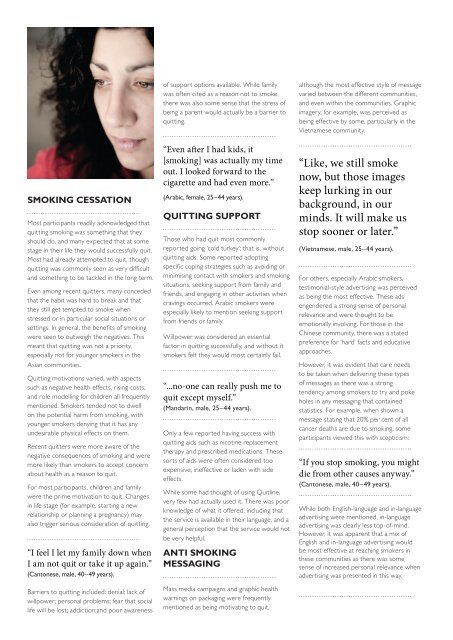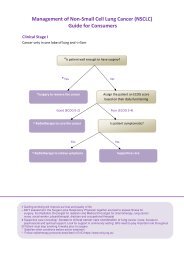tobacco smoking in arabic, chinese and vietnamese communities in ...
tobacco smoking in arabic, chinese and vietnamese communities in ...
tobacco smoking in arabic, chinese and vietnamese communities in ...
Create successful ePaper yourself
Turn your PDF publications into a flip-book with our unique Google optimized e-Paper software.
SMOKING CESSATION<br />
Most participants readily acknowledged that<br />
quitt<strong>in</strong>g <strong>smok<strong>in</strong>g</strong> was someth<strong>in</strong>g that they<br />
should do, <strong>and</strong> many expected that at some<br />
stage <strong>in</strong> their life they would successfully quit.<br />
Most had already attempted to quit, though<br />
quitt<strong>in</strong>g was commonly seen as very difficult<br />
<strong>and</strong> someth<strong>in</strong>g to be tackled <strong>in</strong> the long term.<br />
Even among recent quitters, many conceded<br />
that the habit was hard to break <strong>and</strong> that<br />
they still get tempted to smoke when<br />
stressed or <strong>in</strong> particular social situations or<br />
sett<strong>in</strong>gs. In general, the benefits of <strong>smok<strong>in</strong>g</strong><br />
were seen to outweigh the negatives. This<br />
meant that quitt<strong>in</strong>g was not a priority,<br />
especially not for younger smokers <strong>in</strong> the<br />
Asian <strong>communities</strong>.<br />
Quitt<strong>in</strong>g motivations varied, with aspects<br />
such as negative health effects, ris<strong>in</strong>g costs,<br />
<strong>and</strong> role modell<strong>in</strong>g for children all frequently<br />
mentioned. Smokers tended not to dwell<br />
on the potential harm from <strong>smok<strong>in</strong>g</strong>, with<br />
younger smokers deny<strong>in</strong>g that it has any<br />
undesirable physical effects on them.<br />
Recent quitters were more aware of the<br />
negative consequences of <strong>smok<strong>in</strong>g</strong> <strong>and</strong> were<br />
more likely than smokers to accept concern<br />
about health as a reason to quit.<br />
For most participants, children <strong>and</strong> family<br />
were the prime motivation to quit. Changes<br />
<strong>in</strong> life stage (for example, start<strong>in</strong>g a new<br />
relationship or plann<strong>in</strong>g a pregnancy) may<br />
also trigger serious consideration of quitt<strong>in</strong>g.<br />
“I feel I let my family down when<br />
I am not quit or take it up aga<strong>in</strong>.”<br />
(Cantonese, male, 40–49 years).<br />
Barriers to quitt<strong>in</strong>g <strong>in</strong>cluded: denial; lack of<br />
willpower; personal problems; fear that social<br />
life will be lost; addiction;<strong>and</strong> poor awareness<br />
of support options available. While family<br />
was often cited as a reason not to smoke,<br />
there was also some sense that the stress of<br />
be<strong>in</strong>g a parent would actually be a barrier to<br />
quitt<strong>in</strong>g.<br />
“Even after I had kids, it<br />
[<strong>smok<strong>in</strong>g</strong>] was actually my time<br />
out. I looked forward to the<br />
cigarette <strong>and</strong> had even more.”<br />
(Arabic, female, 25–44 years).<br />
QUITTING SUPPORT<br />
Those who had quit most commonly<br />
reported go<strong>in</strong>g ‘cold turkey’; that is, without<br />
quitt<strong>in</strong>g aids. Some reported adopt<strong>in</strong>g<br />
specific cop<strong>in</strong>g strategies such as avoid<strong>in</strong>g or<br />
m<strong>in</strong>imis<strong>in</strong>g contact with smokers <strong>and</strong> <strong>smok<strong>in</strong>g</strong><br />
situations, seek<strong>in</strong>g support from family <strong>and</strong><br />
friends, <strong>and</strong> engag<strong>in</strong>g <strong>in</strong> other activities when<br />
crav<strong>in</strong>gs occurred. Arabic smokers were<br />
especially likely to mention seek<strong>in</strong>g support<br />
from friends or family.<br />
Willpower was considered an essential<br />
factor <strong>in</strong> quitt<strong>in</strong>g successfully, <strong>and</strong> without it<br />
smokers felt they would most certa<strong>in</strong>ly fail.<br />
“...no-one can really push me to<br />
quit except myself.”<br />
(M<strong>and</strong>ar<strong>in</strong>, male, 25–44 years).<br />
Only a few reported hav<strong>in</strong>g success with<br />
quitt<strong>in</strong>g aids such as nicot<strong>in</strong>e replacement<br />
therapy <strong>and</strong> prescribed medications. These<br />
sorts of aids were often considered too<br />
expensive, <strong>in</strong>effective or laden with side<br />
effects.<br />
While some had thought of us<strong>in</strong>g Quitl<strong>in</strong>e,<br />
very few had actually used it. There was poor<br />
knowledge of what it offered, <strong>in</strong>clud<strong>in</strong>g that<br />
the service is available <strong>in</strong> their language, <strong>and</strong> a<br />
general perception that the service would not<br />
be very helpful.<br />
ANTI SMOKING<br />
MESSAGING<br />
Mass media campaigns <strong>and</strong> graphic health<br />
warn<strong>in</strong>gs on packag<strong>in</strong>g were frequently<br />
mentioned as be<strong>in</strong>g motivat<strong>in</strong>g to quit,<br />
although the most effective style of message<br />
varied between the different <strong>communities</strong>,<br />
<strong>and</strong> even with<strong>in</strong> the <strong>communities</strong>. Graphic<br />
imagery, for example, was perceived as<br />
be<strong>in</strong>g effective by some, particularly <strong>in</strong> the<br />
Vietnamese community.<br />
“Like, we still smoke<br />
now, but those images<br />
keep lurk<strong>in</strong>g <strong>in</strong> our<br />
background, <strong>in</strong> our<br />
m<strong>in</strong>ds. It will make us<br />
stop sooner or later.”<br />
(Vietnamese, male, 25–44 years).<br />
For others, especially Arabic smokers,<br />
testimonial-style advertis<strong>in</strong>g was perceived<br />
as be<strong>in</strong>g the most effective. These ads<br />
engendered a strong sense of personal<br />
relevance <strong>and</strong> were thought to be<br />
emotionally <strong>in</strong>volv<strong>in</strong>g. For those <strong>in</strong> the<br />
Ch<strong>in</strong>ese community, there was a stated<br />
preference for ‘hard’ facts <strong>and</strong> educative<br />
approaches.<br />
However, it was evident that care needs<br />
to be taken when deliver<strong>in</strong>g these types<br />
of messages as there was a strong<br />
tendency among smokers to try <strong>and</strong> poke<br />
holes <strong>in</strong> any messag<strong>in</strong>g that conta<strong>in</strong>ed<br />
statistics. For example, when shown a<br />
message stat<strong>in</strong>g that 20% per cent of all<br />
cancer deaths are due to <strong>smok<strong>in</strong>g</strong>, some<br />
participants viewed this with scepticism:<br />
“If you stop <strong>smok<strong>in</strong>g</strong>, you might<br />
die from other causes anyway.”<br />
(Cantonese, male, 40–49 years).<br />
While both English-language <strong>and</strong> <strong>in</strong>-language<br />
advertis<strong>in</strong>g were mentioned, <strong>in</strong>-language<br />
advertis<strong>in</strong>g was clearly less top-of-m<strong>in</strong>d.<br />
However, it was apparent that a mix of<br />
English <strong>and</strong> <strong>in</strong>-language advertis<strong>in</strong>g would<br />
be most effective at reach<strong>in</strong>g smokers <strong>in</strong><br />
these <strong>communities</strong> as there was some<br />
sense of <strong>in</strong>creased personal relevance when<br />
advertis<strong>in</strong>g was presented <strong>in</strong> this way.










